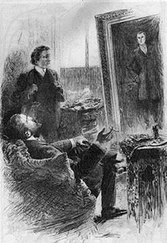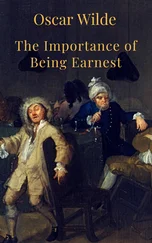"Damn!" he cried as they passed down a slope to where the land divided, and where the wind seemed to hit hardest. His course lay directly northwest, straight against the wind which he could only avoid by hanging the lines over the lever of the brake and fall in behind the trail wagon. But this, unfortunately, placed him too far away from the horses. He had walked all the way, for to walk was apparently the only way to keep from freezing. He soon reached the other side of the draw, and when he had come to the summit beyond, he groaned. Ahead of him just above the dark horizon the sun came suddenly from beneath the clouds. On either side of it, great, gasping sundogs struggled. They seemed to vie with the red sinking orbit; and as he continued his anxious gazing in that direction they seemed to have triumphed, for as the sun sank lower and lower, they appeared suddenly empowered with a mighty force for only a few minutes later the sun had fallen into the great abyss below and the night was on!
"We can make it yet, boys," he cried to his horses as if to cheer them. And as if they understood, they crashed forward with such vigor that he was thrown almost into a trot to keep up.
As to how long it went on thus, or as to how far they had gone, he was not able to reckon; but out of the now pitch darkness he became conscious of a peculiar longing. He had a vision of his sod house that stood on the claim, and he saw the small barn with its shed and the stalls for four. He saw the little house again with its one room, the little monkey stove with an oven on the chimney, and imagined himself putting a pan of baking powder bread therein. He saw his bed, a large, wide, dirty—'tis true—but a warm bed, nevertheless. He fancied himself creeping under the covers and sleeping the sound way he always did. He could not understand his prolific thoughts that followed. He thought of his boyhood back in old Illinois; he took stock of the surroundings he had left there; he lived briefly through the discontentment that had ultimately inspired him to come West. And then he had again those dreams. Regardless of where his train of wandering thoughts began or of where they followed, always they were sure to end upon this given point, the girl. The girl of his dreams—for he had no real girl. There had never been a real girl for Jean Baptiste, for this was his name. In the years that had preceded his coming hither, it had been one relentless effort to get the few thousands together with which to start when he finally came West. At that he had been called lucky. He had no heritage, had Jean Baptiste. His father had given him only the French name that was his, for his father had been poor—but this instant belongs elsewhere. His heritage, then, had been his indefatigable will; his firm determination to make his way; his great desire to make good. But we follow Jean Baptiste and the girl.
Only a myth was she. She had come in a day dream when he came West, but strangely she had stayed. And, singularly as it may seem, he was confident she would come in person some day. He talked with her when he was lonely, and that was almost every day. He told her why he had come West, because he felt it was the place for young manhood. Here with the unbroken prairie all about him; with its virgin soil and undeveloped resources; and the fact that all the east, that part of the east that was Iowa and Illinois had once been as this now was, had once been as wild and undeveloped and had not then been worth any more—indeed, not so much. Here could a young man work out his own destiny. As Iowa and Illinois had been developed, so could this—so would this also be developed. And as railways had formed a network of those states, so in time would they reach this territory as well. In fact it was inevitable what was to come, the prime essential, therefore, for his youth, was to begin with the beginning—and so he had done.
So he had come, had Jean Baptiste, and was living alone with a great hope; with a great hope for the future of this little empire out there in the hollow of God's hand; with a great love, too, for her, his dream girl. So in his prolific visions he talked on with her. He told her that it was a long way to the railroad now—thirty-two miles. He had that far to haul the coal he and others burned. There were yet no fences, and while there were section lines, they were rarely followed. It was nearer by trail. But he was patient, he was perseverant. Time would bring all else—and her. He had visions of her, she was not beautiful; she might not be vivacious, for that belonged to the city; but she was good. Always he understood everything that was hers, and he was confident she would understand him. Her name was sweet and easily pronounced. How he loved to call it!
He staggered at times now and didn't know why. He had wanted to be home and in his bed where he could sleep; but home as he now regarded it was too far. He couldn't make it, and didn't need to. Why should they blunder and pull so hard to get home when all about them was a place where they could rest. The prairie was all about; and he had slept on the ground before with only the soft grass beneath him. Why, then, must he continue on and on! The air was pleasant—warm and luxuriant, and he, Jean Baptiste, was very tired—oh, how tired he really was!
It was settled! He had gone far enough. He would make his bed right where he was. He called to the horses. But somehow they didn't seem to hear. He called again then, he thought, louder, and still they failed to hear. He wondered at their stubbornness. They were good horses and had never disobeyed before. He called now again at the top of his voice, but they heeded him not; in the meantime forging onward, onward and onward! It occurred to him to drop the reins, but such had never been a custom. Within his tired, freezing and brain-fagged mind, there was a resolution that made him cling to them, but struggling to pull them down to a stop he continued.
And as he followed them now onward toward the sod house that stood on the claim, all realism seemed to desert him; he became a chilled mechanician; he seemed to have passed into the infinite where all was vague; where turmoil and peculiar strife only abided.... For Jean Baptiste did not understand that he was on the verge of freezing.
* * * * *
Stewarts were pleased with the country. They had arrived in early January. The weather had not been bad, although the wind blew much stronger here than it did in Indiana. However, they had not forgotten how it blew in Western Kansas and were therefore accustomed to it. The house upon the place they had rented was small, just four rooms, but it was well built and was warm. A village was not far. The people in it called it a town, but you see they were enthusiastic. To be more amply provided they could get what they needed at Gregory which was seven miles. Seven miles was not far to one who could ride horseback, and this Agnes had learned in Western Kansas.
"You had best not go to town today, my girl," cautioned Jack Stewart, her father, as she made ready to ride to Gregory after ordering Bill to saddle Dolly, the gray mare that was their best.
"Tut, tut, papa," she chided. "This is a day to take the benefit of this wonderful air. The low altitude of Nubbin Ridge made me sallow; there was no blood in my cheeks. Here—ah, a nice horseback ride to Gregory will be the best yet for me!"
"I don't like the wind—and so much snow with it," he muttered, looking out with a frown upon his face.
"But the snow is not like it was," she argued, almost ready. "It's letting up."
"It's growing finer, which is evidence that it is growing colder."
"Better still," she cried, jumping about frolickingly, her lithe young body as agile as an athlete's. "Now, dada," she let out winsomely, "I shall dash up to Gregory, get all we need, and be back before the sun goes down!" And with that she kissed away further protest, swung open wide the door, stepped out and vaulted lightly into the saddle. A moment later she was gone, but not before her father cried:
Читать дальше












